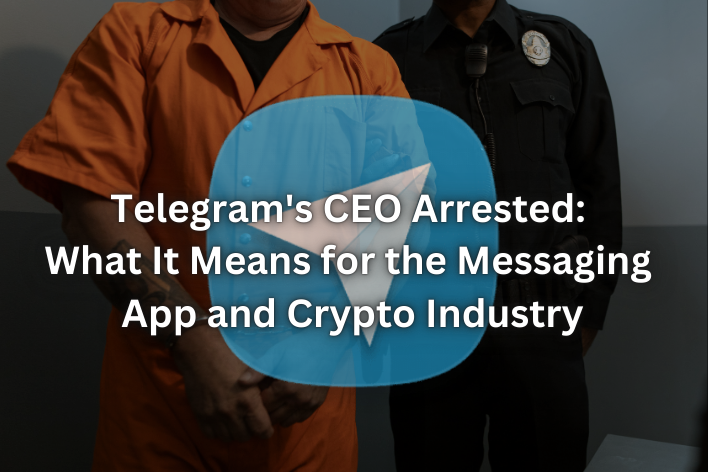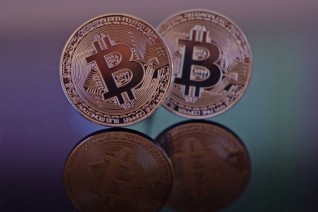Telegram's CEO Arrested: What It Means for the Messaging App and Crypto Industry
The recent arrest of Pavel Durov, the enigmatic CEO and founder of Telegram, has sent shockwaves through both the tech and crypto communities. Known for his unwavering commitment to privacy and freedom of speech, Durov's unexpected detainment in France has cast a shadow over the future of the messaging app and its associated cryptocurrency, TON. As news of the arrest broke, TON experienced a sharp 14% decline, reflecting the uncertainty now looming over the platform and its users. This development marks a pivotal moment for Telegram, raising questions about the balance between privacy, regulation, and the responsibilities of tech giants in an increasingly interconnected world.
Background on Pavel Durov and Telegram
Pavel Durov, often dubbed the "Mark Zuckerberg of Russia," is a visionary entrepreneur and programmer best known for founding Telegram, a messaging app renowned for its strong emphasis on privacy and security. Born in 1984 in Leningrad (now St. Petersburg), Durov first gained recognition as the creator of VKontakte (VK), Russia’s largest social networking site, before moving on to develop Telegram in 2013.
Telegram quickly distinguished itself from other messaging apps by offering end-to-end encryption, self-destructing messages, and a staunch commitment to user privacy, making it the platform of choice for millions worldwide who value their digital security. Under Durov's leadership, Telegram has grown to over 500 million active users, becoming a critical tool for communication, especially in regions with heavy censorship. Durov’s outspoken views on government surveillance and his resistance to censorship have made him a controversial figure, but also a champion for digital privacy, further cementing Telegram’s significance in the global tech landscape.
Details of the Arrest
Pavel Durov's arrest in France on August 24, 2024, has sparked significant controversy, as it appears to be tied to longstanding concerns over Telegram's content moderation policies. French authorities have reportedly detained Durov under accusations that Telegram's platform has been used to facilitate illegal activities, including fraud, drug trafficking, and the dissemination of extremist content. These charges bring to the forefront the ongoing global debate about the responsibilities of tech platforms, particularly those offering encrypted services, in preventing criminal activities while safeguarding user privacy.
Durov's arrest underscores the tension between maintaining privacy on encrypted platforms and adhering to legal obligations to prevent misuse. Telegram, known for its strict privacy features and reluctance to comply with government demands for data access, has often been criticized for not doing enough to curb illegal activities. This incident could lead to increased scrutiny and pressure on other tech companies to balance user privacy with the need for effective content moderation. The arrest not only raises questions about Telegram's future operations but also about the broader implications for encrypted messaging services worldwide.
Impact on Telegram and its User Base
Pavel Durov's arrest poses significant risks to Telegram's operations and the trust it has cultivated among its users. As the face of the platform, Durov's detainment could shake user confidence, particularly among those who rely on Telegram for its robust privacy features. The uncertainty surrounding his legal troubles might lead users to question whether the platform can maintain its commitment to security and resist government pressures without its leader at the helm. Moreover, this event could trigger increased regulatory scrutiny not only in Europe but globally, as governments might see this as an opportunity to push for stricter oversight of encrypted services.
This heightened scrutiny could force Telegram to alter its privacy policies or implement more aggressive content moderation practices, potentially alienating its core user base, which values the platform's resistance to censorship. Additionally, Telegram's reputation in the global market could suffer, especially in regions where trust in the platform's privacy guarantees is paramount. As the situation unfolds, Telegram's ability to navigate these challenges will be crucial in determining its future in the competitive messaging app landscape.
The Effect on TON and the Crypto Market
The arrest of Telegram's CEO has sent shockwaves through the cryptocurrency landscape, particularly impacting Telegram's native cryptocurrency, TON. In the immediate aftermath, TON's value experienced heightened volatility as investors reacted to the uncertainty surrounding the app's leadership and its future development. The arrest has raised concerns about potential disruptions in TON's ongoing projects and regulatory scrutiny that could impede its growth. In the long term, this incident could catalyze significant shifts in investor confidence and market dynamics. The broader crypto industry may see increased caution and volatility as stakeholders reassess their positions and strategies in response to this high-profile disruption. Additionally, the incident may prompt renewed discussions on the intersection of regulatory compliance and crypto innovation, potentially influencing future regulatory frameworks and investor behavior in the space.
What This Means for the Future
The future of Telegram is poised at a crossroads, with both optimistic and pessimistic scenarios emerging from the recent developments. On one hand, Telegram might leverage this challenge to reinforce its commitment to user privacy, potentially leading to strengthened privacy protocols and a renewed focus on safeguarding user data. Such a stance could enhance its reputation as a bastion of digital privacy, attracting users disillusioned with other platforms. Conversely, the company might face increased pressure to alter its privacy policies, potentially compromising its core values to align with regulatory demands or to mitigate further legal risks. This could set a precedent for other tech companies prioritizing user privacy, possibly encouraging broader industry shifts towards compliance with stringent regulatory standards. The ripple effects of Telegram's decisions will likely influence how privacy-centric tech firms navigate their own policy frameworks and regulatory environments in the future.
Conclusion:
The arrest of Telegram's CEO has marked a pivotal moment for both the tech and crypto industries, underscoring the delicate balance between privacy and regulation. The immediate effects on Telegram's cryptocurrency, TON, highlight the volatility and uncertainty that can arise from high-profile disruptions, impacting investor confidence and market stability. Looking ahead, Telegram faces the challenge of navigating its future with either a reinforced commitment to privacy or potential compromises to appease regulatory pressures. This situation serves as a broader lesson for the tech and crypto sectors, emphasizing the ongoing tension between upholding user privacy and adhering to regulatory demands. As the industry moves forward, it will be crucial to watch how this balance evolves and how companies adapt their strategies in response to these complex dynamics. The implications of Durov's arrest may well shape the trajectory of privacy practices and regulatory approaches, influencing the way technology companies and cryptocurrency projects address these critical issues.





